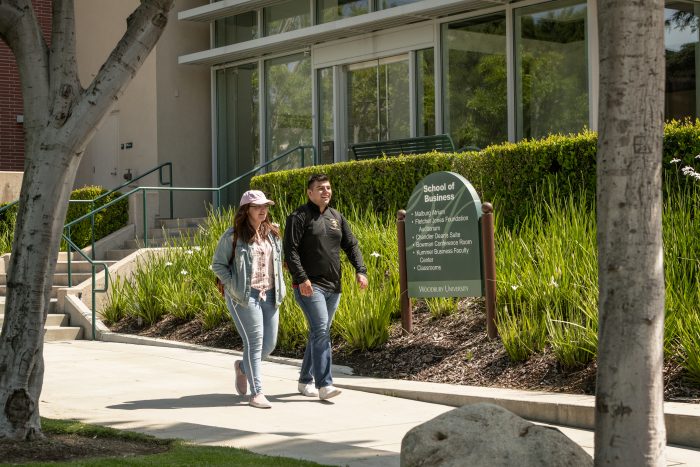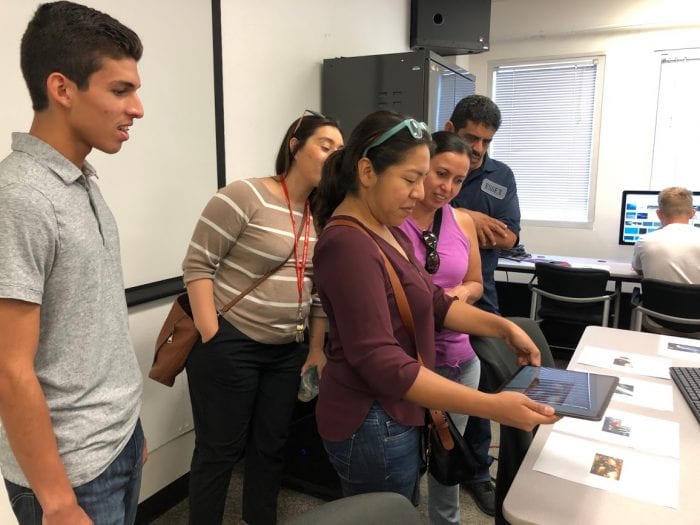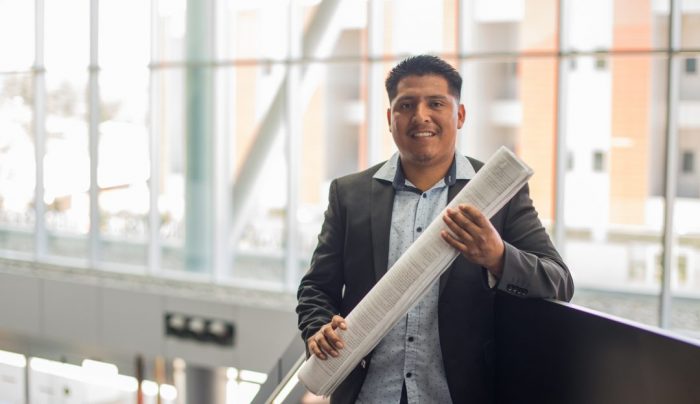Minority Serving Institutions – Title V Grant
Woodbury University is a designated minority serving institution
The U.S Department of Education Title VI Grant assists with strengthening institutional programs, facilities, and services to expand the educational opportunities for Hispanic Americans and other underrepresented populations. Title V grants enable HSI institutions to expand and enhance their academic offerings, program quality, and institutional stability. Woodbury is proud to be designated as a:
- Hispanic-Serving Institution (HSI)
- Asian American Native American Pacific Islander-Serving Institution (AANAPISI)
- Hispanic-Serving Institution Science Technology Engineering Mathematics (HSI STEM)
- Promoting Postbaccalaureate Opportunities for Hispanic Americans
- Strengthening Institutions Program
Learn more from the U.S. Department of Education
Title V Grant
Title V of the Higher Education Act is a federally funded grant program, created in 1998. Woodbury has received Title V funding since 2001.
Title V of the Higher Education Act defines an Hispanic Serving Institutions (HSIs) as an eligible institution that has an enrollment of full-time, undergraduate equivalent students that is at least 25 percent Hispanic at the end of the award year immediately preceding the date of application. Only US citizens and lawful permanent residents are counted for HSI designation. Institutions are eligible to apply for grants if they meet specific statutory and regulatory eligibility requirements. To be designated as an eligible institution of higher education, an institution must apply for and receive designation through an application process.
Since 2001, Woodbury has received Title V funding and, in 2021, the university received its seventh Title V grant, which runs through the 2025 fiscal. year.
Title V of the Higher Education Act, created in 1998, is a federally funded grant program. Woodbury University (WU) has received Title V funds since 2001, is accredited by the Western Association of Schools and Colleges and is a member of the Hispanic Association of Colleges and Universities. Degree offerings include the Bachelor of Arts and Sciences degrees in the arts, sciences, business, architecture, and design. WU also offers Master degrees.
1. 2001-2005
Award Amount: $2,085,735 over 5 years
Completed: 2005
Success: All Objectives met; All Annual Reports and Final Report accepted
This activity, “Pathways to the Professions,” had three components that created comprehensive, coordinated programs for academic support. This activity also utilized our existing educational practices and improved them through the addition of new strategies.
1. Entry-Level Instruction for Student Success – To increase retention and pass rates in basic skills and foundation courses through the creation of a centralized basic skills program and integration of supplemental instruction into college-level curriculum.
2. Student Information for Student Success – To increase accessibility and accuracy of student information for tracking and advising by developing an integrated Student Information System.
3. Advanced Technology for Student Success – To increase efficiency and effectiveness of instruction and student support services through development of alternative instructional delivery methods.
2. 2002-2006
Award Amount: $3,000,000 over 5 years
Completed: 2006
Success: All Objectives met; All Annual Reports and Final Report accepted
WU partnered with Los Angeles Valley College (LAVC), a two-year community college, and provided LAVC students with opportunities to transfer their lower-division credit into baccalaureate degree programs. WU supported them with financial aid and student support services until graduation.
Grant activities included our promoting the following:
• Postbaccalaureate Opportunities to Hispanic Americans (PPOHA)
• Cooperative Collegiate Connections (to improve intercampus processes, design streamlined online transfer credits, and create student-accessible systems)
• Intercampus Programs (to centralize information and services for transfer-oriented students and transferees, and improves transfer, retention, and graduation rates)
3. 2009-2014
Award Amount: $2,788,602 over 5 years
Completed: 2014
Success: All Objectives met; All Annual Reports and Final Report accepted
This PPOHA project created new options in WU’s existing Master of Architecture program, sustained services to support graduate students’ success, and built infrastructure to increase instructional effectiveness. WU conducted ongoing evaluation of the project to ensure the achievement of its objectives. Evaluation produced results regarding each of the Department of Education’s Key Performance Measures.
4. 2010-2015
Award Amount: $3,234,915 over 5 years
Completion: 2015
Success: Annual Objectives met; All Annual Reports and Final Report accepted
This Title V HSI project increased WU’s ability to serve greater numbers of Hispanic and low-income students by developing three new baccalaureate programs in the School of Media, Culture, and Design (MCD): 1. Film, 2. Media Technology, and 3. Game Arts and Design. Each program’s pilot included enrolling community college transfers and embedding internships and career services access into curricula. Select WU facilities were also renovated and equipped to house the new programs. As before, WU conducted ongoing evaluation of this Title V project to support its institutional objectives and goals and to fulfill the purposes of the Title V program.
5. 2014-2019
Award Amount: $2,696,160 over 5 years
Completion: 2019
Success: Annual Objectives met; All Annual Reports and Final Report accepted
This Title V PPOHA project created new options in the existing Master of Interior Architecture program, added new services to support graduate students’ success, and built infrastructure to increase access and instructional effectiveness. WU’s ongoing evaluation produced results for each of the Department of Education’s Key Performance Measures that were reported during and after funding.
_____________________________________________________________________________________
6. 2019-2024
Award Amount: $2,998,681 over 5 years
Completion: Continues until September 30, 2024
Success: Started October 1, 2019
This Title V HSI project is increasing WU’s ability to serve greater numbers of Hispanic and low-income students by developing new baccalaureate programs in Computer Science in the College of Liberal Arts and Sciences, the School of Business, and the School of Architecture regarding internships and career services being embedded in relevant curricula. Each program will pilot curricula as well as have its facilities renovated and newly equipped.
7. 2020-2025
Award Amount: $3,000,000 over 5 years
Completion: Continues until September 30, 2025
Success: Started October 1, 2020
This Title V HSI project will increase WU’s ability to serve greater numbers of Hispanic and low-income students by developing new baccalaureate programs in Sustainable Programs in the College of Liberal Arts and Sciences and the School of Architecture. New program students will be supported by new services and each program will pilot curricula. The relevant University facilities will be renovated and equipped to support the new programs.
Minority Populations
Learn more about the minority populations that Woodbury University serves, and how we are doing so!
| Woodbury University Students: Fall 2022 | Notes | |
| Undergraduate | 868 | |
| ▪ Full-time | 91.9% | |
| ▪ Female/male | 52.5% | |
| ▪ Male | 47.2% | |
| ▪ Minority | 38.9% | Includes American Indian or Alaska Native, Black or African American, Hispanic, Native Hawaiian or Other Pacific Islander. Excluded from the minority category are Asians who are not Native Hawaiian/Pacific Islander. |
| ▪ Hispanic | 33.4% | |
| Pell recipients | 46.8% | Based on Pell receipt during term |
| With financial aid | 94.5% | Fall 2022; based on award year 2022 |
| First-generation | 53.1% | Based on Fall 2022 FTFT cohort; see note below for methodology* |
| Fall 2020-2021 retention | 71.3% | Based on Fall 2021 FTFT cohort |
| Bach. in 6 yrs. or less | 59.1% | Based on Fall 2015 FTFT cohort |
| Faculty: Students | 1:8 | Based on Fall 2022 data; aligned with CDS definition |
*Based on students’ reporting of parental education via the FAFSA. Here, the term “first-generation” has been defined in accordance with the first clause of the Higher Education Act’s definition: “An individual both of whose parents did not complete a baccalaureate degree.” When dealing with unknown or missing values, educational level was assumed to be higher to prevent the over-reporting of first-generation students. As both fields in the FAFSA refer to the highest grade level a parent completed, a student was not considered “first-generation” if both of those fields indicated “College/university or beyond.”
Asian American and Native American Pacific Islander-Serving Institutions (AANAPISI) are defined under the Higher Education Act (HEA) as colleges or universities with an undergraduate enrollment that is at least 10 percent Asian American and Native American Pacific Islander.
The purpose of the Hispanic-Serving Institutions – Science, Technology, Engineering, or Mathematics (HSI STEM) and Articulation Programs is to: (1) increase the number of Hispanic and other low-income students attaining degrees in the fields of science, technology, engineering, or mathematics; and (2) to develop model transfer and articulation agreements between two-year and four-year institutions in such fields.
The Promoting Postbaccalaureate Opportunities for Hispanic Americans (PPOHA):
(1) expand postbaccalaureate educational opportunities for, and improve the academic attainment of, Hispanic students; and (2) expand the postbaccalaureate academic offerings as well as enhance the program quality in the institutions of higher education that are educating the majority of Hispanic college students and helping large numbers of Hispanic and low-income students complete postsecondary degrees.
The program helps eligible institution of higher education to become self-sufficient and expand their capacity to serve low-income students by providing funds to improve and strengthen the academic quality, institutional management, and fiscal stability of eligible institution.




